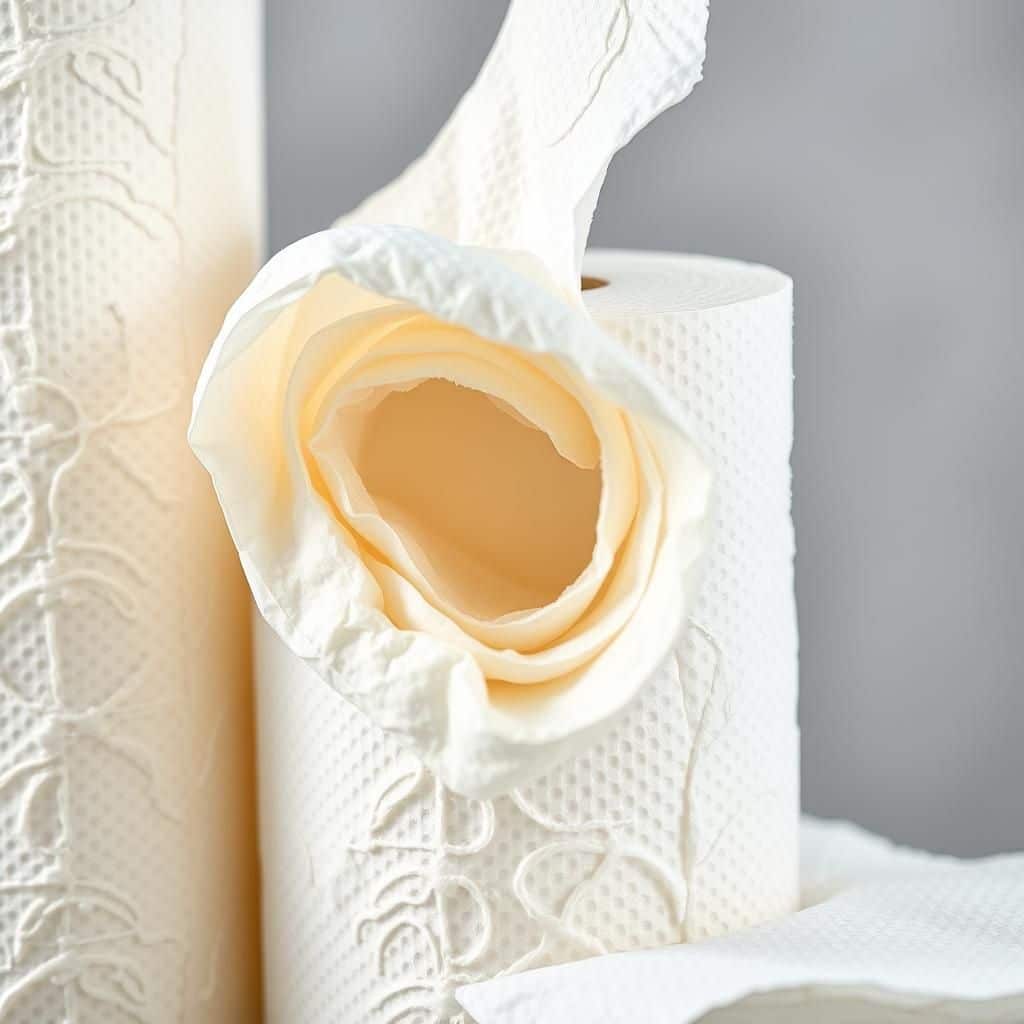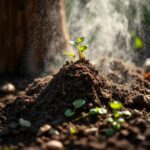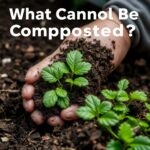Can Paper Towels Be Composted? Discover the Truth About Composting Paper Products

As environmental concerns continue to rise, many individuals are seeking ways to reduce waste and adopt eco-friendly practices. One frequently asked question in the realm of sustainable living is whether paper towels can be composted. While they are often seen as a disposable convenience, understanding the compostability of paper products is essential for responsible waste management. This article delves into the truth about composting paper towels, exploring their materials, the impact of additives, and how they fit into the composting process. Join us as we uncover the facts and guide you towards making informed decisions for a greener future.
Can Paper Towels Be Composted?
Composting paper towels can be a bit tricky due to the materials they are made from and what they are often used for. While brown paper towels, which are typically made from recycled paper and contain no harmful chemicals, can be composted, colored or printed paper towels may introduce unwanted chemicals into the compost. Additionally, if the paper towels are used to clean up food particles, they may be acceptable in a compost pile, but those soiled with harsh chemicals or grease should be discarded as they may hinder the composting process. Therefore, it is essential to evaluate the type of paper towel and its previous usage before deciding to compost them.
Types of Paper Towels
Different types of paper towels are designed for various purposes, and their composition can significantly affect compostability. Unbleached brown paper towels, often made from recycled paper, are generally acceptable for composting, as they break down easily and contribute valuable carbon to the compost pile. On the other hand, bleached or colored paper towels typically contain chemical additives that can harm the composting process and should be avoided. It is crucial to identify the type of paper towel you use to determine if it can safely return to the soil.
Soil Contamination
When considering composting paper towels, one must be cautious about soil contamination. Paper towels used to wipe up chemical spills, harsh cleaners, or oily substances can introduce pollutants into the compost, ultimately affecting the quality of the final product. It is vital to avoid composting any paper towels that have been in contact with toxic substances, as these may disrupt the microbial balance and nutrient profile of the compost.
Composting Process
The composting process involves breaking organic materials down into nutrient-rich soil. Paper towels can add carbon to a compost pile, but they should be balanced with nitrogen-rich materials like fruits and vegetables for optimal decomposition. To improve the breakdown of paper towels, it is helpful to shred them before adding them to the pile, as smaller pieces decompose more rapidly. Maintaining proper moisture and aeration levels will further facilitate the composting process, ensuring that all materials, including paper towels, break down effectively.
Choosing the Right Compost Bin
When composting paper towels, selecting the right compost bin can make a difference in the efficiency of the process. A closed compost bin helps to maintain moisture and heat, which are essential for breaking down materials, including paper towels. Furthermore, using a worm bin, or vermicomposting, can also be an effective method to compost paper products, as worms thrive on carbon-rich materials like paper. It's essential to monitor the bin regularly to ensure that the composting process is proceeding correctly and address any issues with odor or excess moisture.
Alternatives to Composting Paper Towels
For those concerned about composting paper towels, there are several efficient alternatives. Reusable cloth towels are an environmentally friendly option, reducing reliance on disposable products and promoting sustainability. If using paper towels, consider collecting them for recycling if they are heavily bleached or treated, or use them in a waste-to-energy incineration system where proper facilities are available. Always evaluate local waste management guidelines to find the best disposal method that aligns with environmental practices.
| Type of Paper Towel | Compostable? | Notes |
|---|---|---|
| Unbleached Brown Paper Towels | Yes | Break down easily, safe for composting |
| Bleached Paper Towels | No | Contain chemicals that may harm compost |
| Colored Paper Towels | No | May introduce unwanted chemicals |
| Soaked with Chemicals | No | Risk of soil contamination |
| Soiled with Food Waste | Yes | Acceptable if primarily food-safe |
Why can't paper towels be composted?

Paper towels are often categorized as compostable materials due to their organic composition; however, they pose specific challenges in the composting process that can lead to issues in both home and industrial compost systems. The main reasons paper towels cannot be effectively composted include the presence of chemicals, contamination concerns, and the degradation process.
Chemical Contaminants
Paper towels can be treated with various chemicals during their production or use, which can hinder their compostability. These contaminants may include:
- Bleaching agents: Many paper towels are bleached to achieve a white appearance, which can introduce harmful chemicals.
- Fragrances: Some brands include artificial fragrances that may not break down properly in the composting process.
- Cleaning products: Paper towels used for cleaning can carry residues of detergents or disinfectants that are harmful to compost organisms.
Contamination Risks
Using paper towels in compost can lead to contamination of the compost batch, complicating the composting process. The risks include:
- Bacterial contamination: If the towels are used for cleaning up food spills, they may carry bacteria that can affect compost quality.
- Pesticides: Some paper towels may have been in contact with products that contain pesticides, affecting the safety of the resulting compost.
- Cross-contamination: The mixing of contaminated paper towels with organic compost material can result in unsafe compost for gardening.
Decomposition Time
The decomposition of paper towels often takes longer than that of typical compost materials, which can disrupt the microbial balance in a compost pile. Key points include:
- Slower breakdown: The fibers in paper towels may not degrade as quickly as food scraps or yard waste.
- Carbon-to-nitrogen ratio: Paper towels can alter the ideal carbon-to-nitrogen ratio needed for efficient composting.
- Clumping tendency: Wet paper towels can clump together, restricting airflow and slowing down the composting process.
Differences in Composting Systems
Different composting methods address materials based on their composition and characteristics. Consideration of these factors includes:
- Commercial composting: Industrial facilities often have strict criteria and may not accept materials with potential chemical contaminants.
- Backyard composting: Home compost systems may struggle with the volume or type of materials incorporated.
- Hot composting: High temperatures necessary for pathogen elimination might not be reached if too many paper towels are included.
Alternatives to Composting Paper Towels
Given the issues associated with composting paper towels, there are several viable alternatives for disposal:
See also:
- Recycling: Although not all paper towels are accepted, checking local guidelines for recycling options is beneficial.
- Trash disposal: Proper disposal in the trash may be the most responsible choice if no composting alternatives are available.
- Biodegradable options: Using compostable paper towels made from 100% recycled materials can be more eco-friendly and compost-compatible.
Is Bounty paper towels compostable?

Bounty paper towels are not compostable. Although they are made from paper and appear to be a natural product, they often contain synthetic fibers, dyes, and chemicals that prevent them from breaking down properly in a composting environment. Furthermore, the presence of food residues or chemicals can contaminate the compost, making it unsuitable for gardening or agricultural use.
Composition of Bounty Paper Towels
Bounty paper towels are primarily made from wood pulp, but the manufacturing process may include various additives. These materials often include:
- Synthetic fibers - Added for durability and absorbency.
- Dyes - Used for coloring, which can introduce chemicals that are not compost-friendly.
- Bonding agents - Chemicals that help keep the sheets together but don't decompose easily.
As a result, while they are made from paper, the additional materials can hinder their compostability.
What Makes Paper Towels Compostable?
For a paper towel to be considered compostable, it must break down into natural elements in a composting environment within a specific timeframe without leaving harmful residues. Key factors include:
- Natural materials - Must be free from synthetic additives and chemicals.
- Low contamination risk - Should not have food residues that can introduce pathogens.
- Rapid biodegradation - Needs to decompose quickly to ensure the compost won't spoil.
Bounty paper towels fail to meet these criteria, making them unsuitable for composting.
Alternatives to Bounty Paper Towels
If you're looking for more eco-friendly options for cleaning up spills or messes, consider alternatives that are compostable:
- Unbleached paper towels - Often made from recycled materials and without harmful additives.
- Reusable cloths - Made from natural fibers like cotton or bamboo, which can be washed and reused.
- Biodegradable paper towels - Specifically designed to be compostable, made from safe materials.
These options can serve the same purpose while being more environmentally responsible.
Impacts of Non-Compostable Products
Using products like Bounty paper towels contributes to waste that cannot easily break down. The implications include:
- Landfill accumulation - Non-biodegradable materials contribute to landfill overcrowding.
- Environmental pollution - Chemicals can leach into the soil and water systems.
- Resource inefficiency - Wasting materials that could have been composted or recycled.
These factors highlight the environmental concerns associated with disposable paper products.
How to Dispose of Bounty Paper Towels Properly
Since Bounty paper towels are not compostable, they should be disposed of in the regular trash. Here are some guidelines:
- Avoid flushing - Do not dispose of paper towels in toilets; this can cause clogs.
- Use a designated bin - Keep a trash bin in places where you frequently use paper towels.
- Consider recycling where possible - If clean and unsoiled, some facilities may accept them for recycling.
Following these guidelines helps ensure that Bounty paper towels are disposed of correctly while mitigating negative environmental impacts.
How long does it take for a paper towel to compost?

The time it takes for a paper towel to compost can vary based on several factors, including the composition of the towel, the environmental conditions, and the method of composting used. Generally, paper towels are made from biodegradable materials such as wood pulp, which allows them to break down relatively quickly in a composting environment. Under optimal conditions, paper towels can take about 2 to 4 weeks to decompose fully in a compost pile.
See also:
Factors Affecting Composting Time
The rate at which paper towels compost can be influenced by multiple factors. These include:
- Moisture Level: The right amount of moisture is crucial. Too dry, and decomposition slows down; too wet, and it may lead to anaerobic conditions.
- Temperature: Warmer temperatures typically accelerate the composting process, often found in active compost piles.
- Oxygen Availability: A well-aerated compost pile promotes faster breakdown of materials, including paper towels.
Types of Paper Towels
Not all paper towels are created equal, and their compostability can vary. Some key points include:
- Unbleached Towels: Typically compost more quickly as they contain fewer chemicals and dyes compared to bleached varieties.
- Multi-Ply Towels: These may take longer to break down due to their increased thickness and density.
- Recycled Paper Towels: Generally decompose similarly to standard paper towels, but additives in recycled versions may affect breakdown.
Composting Methods
Different composting methods can impact how fast paper towels break down:
- Bokashi Composting: This anaerobic method may speed up the breakdown of paper towels due to microbial activity.
- Hot Composting: This technique creates high temperatures that can reduce composting time significantly.
- Cold Composting: A slower method that typically results in a longer composting time of paper towels.
Best Practices for Composting Paper Towels
To ensure efficient composting of paper towels, consider the following practices:
- Shred Towels: Smaller pieces increase surface area, facilitating faster decomposition.
- Balance Greens and Browns: Combine paper towels (browns) with nitrogen-rich materials (greens) for optimal compost balance.
- Turn the Pile: Regularly aerating the compost helps maintain an aerobic environment, speeding up decomposition.
Environmental Impact of Composting Paper Towels
Composting paper towels has notable environmental benefits:
- Reduces Waste: Diverting paper towels from landfills lowers the overall waste produced.
- Enhances Soil Quality: Decomposed paper towels add nutrients to soil, enriching it for future plant growth.
- Decreases Methane Emissions: Composting prevents methane production that occurs when organic waste decomposes anaerobically in landfills.
What three items should not be placed in a compost pile?
:max_bytes(150000):strip_icc()/thingstonevercompost-e693cac2fe544c6b8a50489412d18205.png)
When considering items for a compost pile, it's essential to understand what should not be included, as certain materials can disrupt the composting process or introduce harmful substances. Here are three items that should never be placed in a compost pile:
1. Meat and Dairy Products
Adding meat and dairy products to a compost pile can create several issues. These items can attract pests like rats and raccoons, leading to an imbalance in your composting system. Additionally, they can generate unpleasant odors as they decompose.
Reasons to Avoid Meat and Dairy
- Pest Attraction: These food items can entice unwanted animals, making your compost pile a nuisance.
- Odor Issues: As these materials break down, they can produce foul smells that may be unpleasant.
- Pathogen Risks: Meat and dairy can harbor pathogens that could pose risks to human health.
2. Oils and Fats
While small amounts of plant-based oils can be acceptable in moderation, large quantities or animal fats should be completely avoided. Oils and fats can create a slick layer that inhibits airflow within the compost, resulting in anaerobic conditions and foul odors.
Impact of Oils and Fats on Compost
- Aeration Blockage: Oils can prevent proper aeration, slowing down the composting process.
- Unpleasant Odors: Decomposing oils can become rancid and produce bad smells.
- Microbial Imbalance: They can disrupt the balance of beneficial microbes required for effective composting.
3. Diseased Plants and Weeds
Adding diseased plants or invasive weeds to a compost pile can risk spreading pathogens or weed seeds when the compost is used in gardens. High temperatures achieved in a properly maintained compost pile may not be sufficient to kill off these diseases or seeds, leading to future issues in your garden.
Why Diseased Plants and Weeds are Problematic
- Spread of Disease: Infected plant material can introduce diseases back into your garden soil.
- Weed Proliferation: Seeds from invasive weeds may survive the composting process and sprout later.
- Dilution of Nutrients: Contaminated compost can harm healthy plants and dilute the effectiveness of your compost.
Questions from Our Readers
Can paper towels be composted?
Yes, paper towels can generally be composted if they are free from heavy-duty contaminants. However, it is important to ensure that they are not heavily soiled with chemicals or non-biodegradable substances, as this can affect the quality of the compost.
What types of paper towels are safe for composting?
Unbleached and chemical-free paper towels are the safest options for composting. If they are used to wipe up food messes or organic materials, they can be a beneficial addition to your compost pile.
Are there any paper towels that should not be composted?
Yes, paper towels that have been used to clean up grease, chemicals, or synthetic substances should not be composted, as they can introduce harmful toxins into your compost and ultimately the soil.
How should I compost paper towels?
To compost paper towels, simply tear them into smaller pieces and mix them into the compost pile, ensuring a balance of greens and browns. This helps speed up the decomposition process and contributes to a healthy compost mixture.
See also:

If you want to read more articles like Can Paper Towels Be Composted? Discover the Truth About Composting Paper Products, we recommend you check out our Compost category.
Leave a Reply
Related Articles